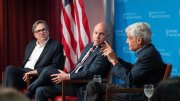Dean of the Kennedy School of Government Joseph S. Nye announced in early September that he intends to step down as dean this coming June. Nye was appointed in 1995, after a two-year leave of absence spent as assistant secretary of defense for international security affairs. He has led the school through a period of extraordinary growth during his eight-year tenure, increasing the number of core faculty members by 40 percent.
University president Lawrence H. Summers saluted Nye's leadership at the faculty meeting where the announcement was made. "Whoever succeeds Joe," Summers said, "will inherit a school that is focused, intellectually vital, strongly engaged with the world, and in healthy financial condition." Though the school ran a deficit of $5.9 million in 2002—the result of rapid expansion into a declining economy—cost-cutting measures, combined with fundraising, yielded a slight surplus by the end of the 2003 academic year. During Nye's tenure, the school raised $250 million and the endowment tripled—though he credits Harvard's money managers for most of that growth.
Asked in an interview what accomplishments he is most proud of, Nye points not only to the growth of the faculty but also to its "increased diversity by both gender and ethnicity," to the high ratings that students give to the quality of the teaching (4.3 on a 5-point scale), and to a 138 percent increase in scholarly citations of work produced at the school, an independent measure of the faculty's quality. The executive training programs for mid-career professionals tripled in size, a program on women and public policy was established, and five new research centers were created: the Hauser Center on Nonprofit Institutions; the Center for International Development; the Carr Center for Human Rights Policy; the Ash Center for Democracy and Innovation; and the Center for Public Leadership.
Nye also added a new degree program, the master's of public administration in international development. Incoming students (boasting an average score of 750 on the Graduate Record Exam), combine "calculus-based mathematics with practical field work in developing countries," says Nye. The program, "designed to train people for work in finance ministries, ministries of development, the World Bank, and so forth, has been a great success." As a result, the school's student population is slightly larger, but the quality of the students (as measured on the GRE) has risen. Nye attributes this to an increased interest in public affairs. (Even within the ranks of Kennedy School students, interest in public service has grown in recent years: 80 percent of alumni now pursue service in government or the nonprofit sector, he says.)
As dean of Harvard's most international school (more than 40 percent of the students come from abroad), Nye has increased the emphasis on public leadership. "We started with one course on leadership, and now there are half a dozen," he says. He has also encouraged interdisciplinary research of practical relevance to the solution of public problems. "Visions of Governance for the 21st Century," a faculty research collaboration established by Nye, has already produced several books.
What's left to do? "Lots," says Nye. "I'd like to see us do more in the area of information technology...to increase our study of how [it] affects the processes of democratic government [and] to explore the use of distance learning" and how to "combine it with what we do here in Cambridge." He'd like more research on how healthcare and biotechnology are affecting public policy. Finally, says Nye, "we need to do more for undergraduates," an idea cited as "an area for exploration" in the school's most recent five-year plan. The possibilities range from making cross-registration easier, to a certificate program, to a possible joint program leading to some form of degree. But "each dean," he notes "brings his or her own perspective" about what is important.
When his deanship ends, Nye will return to research and teaching as Price professor of public policy at the Kennedy School. (He taught a very popular undergraduate Core course on international conflict before he left for Washington, D.C.) He will also continue writing—his book Soft Power, about getting the outcomes you want through attraction, will be published in the spring. "Somebody once said that being a professor is the best job at a University because you have all the irresponsibility," he joked. "I'm looking forward to the irresponsibility."








